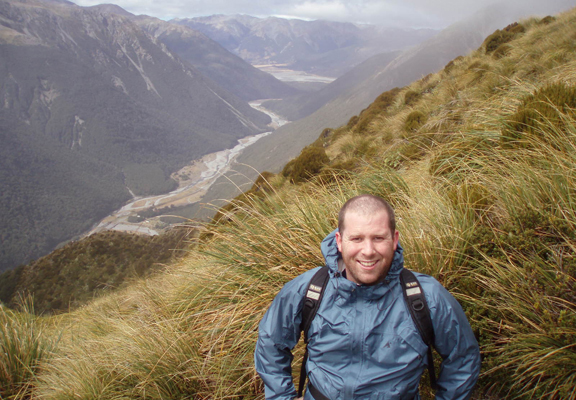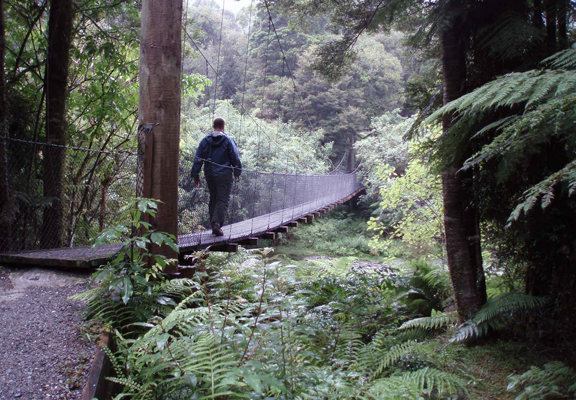On the Road: Writer’s Retreat
Let’s ignore the fact that you’ll never work again. Skip over the part where you die alone and penniless on a twice-flipped mattress in some dockside flophouse. Such fates are inevitable if you walk away from your job. Accept it. Move on.
I know that’s slightly unfair to say, because I did exactly what you’re thinking of doing, and yet here I sit with all my original teeth and a perfectly pleasant relationship with my creditors. Still, it’s what folks told me, so I’m riling up your muse with an equal punch of pessimism.

That’s right. In 2007, against all warnings, I traded my desk job in Manhattan for the wilds of New Zealand. The plan was to wander a bit, to clear my head so that I may pursue a dream: Writing full time. It was a gamble, but for some reason that didn’t worry me. I knew that when I was checked into hereafter and they asked me, “did it all work out?” I could at least shrug my shoulders and say, “I gave it a shot.”
Of course, giving it a shot can mean different things to different people. Here’s what it meant for me:
Actually writing
At first, I pledged to take time off from pounding the keys. I thought traveling was about unencumbered reflection. I quickly discovered it was also about sitting around, about dead hours in the mornings and evenings, bad weather keeping me hostel-bound in comfy chairs next to fireplaces. There was ample time and inspiration to write. In my office monkey days, staring at a computer was the last thing I wanted to do with my free time. In New Zealand, after a day of driving or exploring, sitting down with a laptop was as welcome as cracking a beer. And since wi-fi was, more often than not, purchased by the minute, I didn’t have the funds to be distracted by the latest videos of slow lorises.
Junking things
I did a lot of tramping (learn the local lingo, gang). At one point, I tossed my ragged boots into a rubbish bin (see that?). They had reached their expiration date, but it was also a symbolic gesture. I was saying goodbye to some old writing as well. I had written my first novel three years prior and had tried, unsuccessfully, to find representation for it. If I had stayed home, I might still be tinkering with the thing. Sure, it had gotten me somewhere as a writer, but it was a muddy manuscript, full of un-patchable holes (and footwear metaphors). Junking jobs and boots granted me the courage to junk that first novel and concentrate on something new.
Disabusing myself
I was a traveler, but it didn’t mean I was a travel writer. Many fall into the trap of thinking, “I must be the first son-of-a-gun to backpack across New Zealand—I jot it all down, I’ll be the next Paul Theroux.” Even if travel writing was a vibrant market (it wasn’t and it isn’t), it didn’t mean I had the skills to pen a bestseller. I had to accept this early. Traveling isn’t a writing skill. My abilities were more suited to children’s fiction, so that’s what I concentrated on. I saved the observations and anecdotes for my journal.

Networking out of network
I met two types of people on the road: those taking a break from life and…Germans. Lots of Germans. Many were fresh out of school, but some had well-established careers back home. None could recommend an agent or introduce me to a publisher. That didn’t matter. These connections were more important as confirmations that I wasn’t some foolhardy dreamer or, if I was, that there were plenty of others like me. We sat around at night talking about the crazy things we’d do upon our return to the “real world.” One woman planned to open a cupcake shop. There was a guy determined to swap banking for bicycle repair. The Germans, contrary to their grim reputations, were the freest of spirits, with many simply declaring “I am going to continue traveling,” in thick Bavarian accents.
Time-traveling
Publishing is a slow business. Even on the Internet. Would you be surprised to learn that I’m writing this article in January 2008? (And using the cash to apply for my third adjustable rate mortgage!) When I left on my break, I had some pieces on submission and queries out with agents. Normally, that would lead to weeks of refreshing the Inbox every 15 seconds. Hard to do when you’re challenging some Dane to a scree-surfing race down a volcano. The rejections came slowly, but they came with little notice. When I’d returned to the U.S., it was like I’d hopped over all that anxiety and into the future. Sure, I was unemployed, with nothing floating out there. But I was unburdened. I had the beginnings of a novel, a nothing-to-lose attitude and the confidence that a clean slate can be a good thing. With nary a flophouse in sight, I’m still confident it can.
Aaron Starmer wrote much of DWEEB (Random House, 2009) in backpacker lodges.
His latest, The Only Ones (Random House, 2011), was written in his new office—a desk in his living room next to pictures of Tahiti, Kenya and, naturally, New Zealand.
Visit him at www.aaronstarmer.com.






